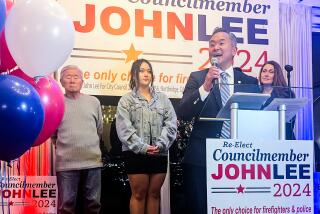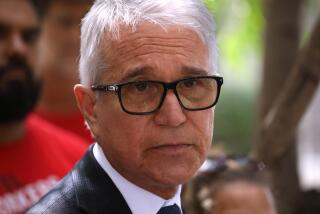A year before balloting, L.A. mayoral hopefuls build voting blocs
- Share via
If the Los Angeles mayoral race were a dinner party, the folks around the table would have plenty to talk about. At one time, all four of the leading contenders served together at City Hall.
But one year before the primary election, the candidates are beginning to play up their differences as they quietly work to assemble key blocs of voters.
The field includes two officeholders vying to be the city’s first female mayor; a well-seasoned scion of a Los Angeles political family; and a wealthy one-time Wall Street investment banker who oversaw a large swath of city government for Mayor Antonio Villaraigosa.
With the exception of a fifth candidate, a gay, outspoken former talk radio host who wants to make the City Council part time, the front-runners have yet to stake out bold, defining initiatives. While several seem to be testing an “insider-outsider” strategy, carefully calibrating their experience in city government with promises of fresh leadership to fix what’s broken, few have taken direct shots at their opponents or offered a clear judgment on Villaraigosa’s seven-year stewardship.
Political scientists say that’s partly the calculus of a nonpartisan open-seat primary election in a city as diverse as Los Angeles. While relatively narrow but motivated groups of constituencies could catapult two of the candidates into a runoff, they have to be careful not to alienate voters citywide. They’ll need them for a head-to-head contest in May.
Several factors in the electoral math are still in flux, including the possibility of new candidates entering the race. And there’s the open question of whether the contenders will embrace or distance themselves from Villaraigosa, a polarizing figure who still has strong support among the Latino voters who make up about a fourth of the electorate.
City Controller Wendy Greuel is angling to capture another significant trove of voters in the San Fernando Valley, where she was born and raised and which she partly represented on the City Council. Quality-of-life issues are important in the Valley, which delivers up to 45% of the vote, and Greuel often recalls the weekend she donned work gloves and helped city crews fill 700 potholes there.
For the last two years, Greuel, 50, has used her office’s audits as an opportunity to attack inefficiencies in city departments. But she also has come under fire for criticizing city policies that she approved while on the council, including a little-known “Gold Card” system for handling parking citations used by City Hall insiders.
A one-time movie studio executive, Greuel drew sustained applause last week when she mentioned her candidacy to a professional women’s group in Century City. But while she hopes to rally women for her campaign, she will face competition from three-term Councilwoman Jan Perry.
Like Greuel, 56-year-old Perry has tried to cultivate a reputation for candor. At a recent mayoral forum, where candidates were asked about ongoing investigations into bribery at the Department of Building and Safety and misconduct at the Housing Authority and on the Coliseum Commission, Perry complained about corruption at City Hall.
She’s at war with City Council President Herb Wesson and the city’s redistricting commission, which has proposed stripping much of downtown from her district. Perry has made her mark downtown, helping to smooth the way for L.A. Live and AEG’s proposed NFL stadium, as well as a controversial signage district to allow large electronic billboards.
Perry, the only African American candidate in the race, says development is an essential tool for community improvement. Much of her district takes in low-income South L.A., where last weekend she boasted to a church crowd about bringing grocery stores and town homes with granite countertops to the area.
The only high-profile candidate of Latino descent is City Councilman Eric Garcetti, son of former Los Angeles County Dist. Atty. Gil Garcetti. In a speech at a funeral for a Latino journalist last year, Garcetti, whose father is part Mexican, described himself as a “Chicano.”
But although he speaks fluent Spanish, the degree of his appeal to that community and its leaders remains to be seen. His privileged upbringing — he went to high school at L.A.’s tony Harvard-Westlake school and then attended Columbia University and Oxford — is different from Villaraigosa’s and that of some other members of the city’s powerful Latino leadership. At 41, he is the youngest of the front-runners, and his views on social issues and the environment align him especially with liberal, urban progressives in the city’s central core. He championed a $500-million clean-water measure and has helped revitalize Hollywood, concentrating new growth around Metro stops.
Garcetti’s critics say he can waffle at times, but he counters that during his four years as City Council president he was a consensus-builder. He often waxes optimistically about the city’s culture and future and his desire to “make L.A. great again.”
The candidate with the most work to do in getting his name recognized is also the candidate with the most personal wealth. Austin Beutner, a former investment banker who lives in Pacific Palisades, made headlines in recent months by taking swings at City Hall and the people who run it. In an economic speech, he called the place a “barnyard.”
Beutner says the city needs to eliminate the business tax, streamline the regulation process and fix roads. When he was 90 minutes late to an appearance at a neighborhood council meeting because of traffic, he told the crowd: “Los Angeles ain’t working for me; how about you?”
Beutner, 51, may excite the business community, but he toes a tricky line with his anti-City Hall rhetoric. For more than a year, he worked as Villaraigosa’s “jobs czar,” overseeing 13 departments for the mayor. He has criticized some of the mayor’s initiatives, like a new contract with the police union that Beutner says kicked costs down the road, but he recently praised Villaraigosa as a “dreamer” who sets forth big ideas.
One candidate regularly skewering City Hall is Kevin James, a former federal prosecutor and until recently the host of a local radio show. The only Republican in the race, as well as the only openly gay candidate, 48-year-old James is trailing in fundraising but vows to take his case to make the City Council part-time to every neighborhood council in the city.
Mall developer Rick Caruso, who built the Grove shopping center, could still enter. Caruso, 53, recently withdrew a bid to buy the Dodgers and switched his voter registration from Republican to decline-to-state — a savvy choice in heavily Democratic Los Angeles. He could compete for Beutner’s pro-business base.
Another wild card is Zev Yaroslavsky, who continues to flirt with running. The 63-year-old county supervisor, who is termed out of office in 2014, is well-known in the Jewish community, on the Westside and in the Valley. He would pose an immediate challenge to Greuel for voters in the Valley, said Raphael Sonenshein, director of the Pat Brown Institute of Public Affairs at Cal State L.A.
But voters may not be as familiar with Yaroslavsky as some pundits assume, he said. Many city voters don’t follow county politics, Sonenshein said, and Yaroslavsky, like the others, would have to work to reach beyond his base.
“They’re each known in a sphere, in a circle,” Sonenshein said. “But eventually they’re going to have to introduce themselves citywide.”
More to Read
Sign up for Essential California
The most important California stories and recommendations in your inbox every morning.
You may occasionally receive promotional content from the Los Angeles Times.














